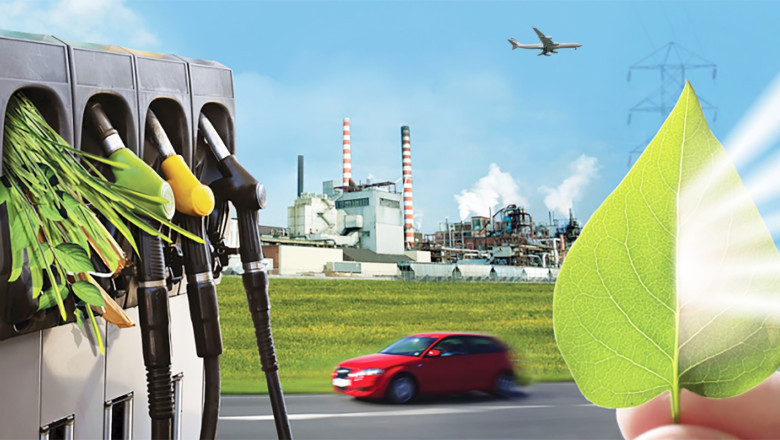views

Brazil Leading the Way In Biofuel Production
Brazil has emerged as one of the global leaders in the production and use of biofuels. With a thriving sugarcane industry and supportive government policies, the South American nation has been able to make significant strides in renewable fuels over the past two decades.
Sugarcane Ethanol Dominates Brazilian Fuel Supply
By far the most dominant Biofuel in Brazil is ethanol produced from sugarcane. The tropical climate and fertile soil of the country make it ideal for large-scale sugarcane cultivation. Brazil accounts for over 30% of the world's sugarcane output annually. Sugar mills across the country process sugarcane juice into ethanol that is blended with gasoline. Ethanol made up over 50% of all road transportation fuel used in Brazil in 2019. Versatile flex-fuel vehicles that can run on any blend of gasoline and ethanol make up over 90% of new car sales. The nationwide blend of gasoline sold at pumps is around 27% ethanol. This high blend reduces carbon emissions from vehicles considerably.
The success of Brazil's ethanol program can be attributed to strong government support over many decades. Mandatory blending of gasoline with hydrous ethanol was instituted in the 1970s during the oil crisis. Subsidies and tax breaks were provided to sugar mills and flex-fuel car makers. Investments were made in infrastructure like dedicated ethanol pipelines. Today Brazil is self-sufficient in fuel ethanol and a major exporter as well. The accumulated experience and scale of production have brought costs down substantially over the years.
Advantages of Sugarcane Over Corn Ethanol
While the United States is the other major producer of fuel-grade ethanol, the feedstock used is corn rather than sugarcane. There are significant advantages to using sugarcane:
- Sugarcane yields more ethanol per acre compared to corn. Brazilian mills extract around 8000 liters of ethanol from every hectare of sugarcane grown. Corn ethanol yields in the US average around 2500-3000 liters per hectare.
- Sugarcane biomass left over after juice extraction is used to generate renewable power needed for distillation at mills. This makes sugarcane ethanol a net energy exporter unlike corn.
- There are 3-4 harvests possible from the same sugarcane fields every year as the crop is a perennial grass. This compared to just one harvest annually for corn.
- Ethanol is not the only product from sugarcane processing. Sugar, bagasse, and molasses also generate additional revenue streams.
These economic and agricultural factors have allowed Brazil to profitably produce ethanol as a bulk commodity for the fuel market as well as for exports. The sugarcane industry is a major job provider and earner of foreign exchange in the Brazilian economy.
Biodiesel Emerging as Another Biofuel Option
While sugarcane ethanol dominates, Brazil is diversifying into other advanced biofuels as well. Biodiesel produced from vegetable oils is one such alternative gaining ground. The Brazilian biodiesel program launched in 2005 and a mandatory national blend of diesel and biodiesel was instituted. Starting at just 2%, the blend level has progressively increased over the years and currently stands at 12%. Feedstocks permitted include soybean oil, palm oil, animal fats, and waste cooking oil.
More than 50 biodiesel plants are presently operating across thecountry. The Brazilian biodiesel sector employs over 50 thousand people directly and indirectly. Total annual production capacity exceeds 5 billion liters currently. Like ethanol, biodiesel production and use is supported through a system of subsidies, tax incentives, and procurement obligations on fuel suppliers. Biodiesel exports are also being promoted to markets in Europe and Asia.
Newer Pathways Under Research And Development
Looking ahead, Brazil continues to focus research on cellulosic ethanol and other advanced biofuels that do not compete with food crops. Sugarcane bagasse is being evaluated for breaking down into fermentable sugars for second-generation ethanol production. Algae biofuel and biojet fuel are other promising avenues gaining ground. Brazilian scientists are working with universities abroad on projects involving enzymatic hydrolysis, gasification, and other novel conversion methods. This R&D is positioning Brazil to transition from first-generation sugarcane ethanol to even more sustainable innovative bioenergy in the coming decades.
Overall, Brazil's holistic approach integrating biofuel production with agricultural and industrial development offers valuable lessons for other countries. With a large population still dependent on traditional fuels, the potential exists for the South American leader to increase both domestic consumption of renewables as well as global exports in the years ahead. Its role as the world's top biofuel producer is poised to grow further.
Get more insights on this topic: https://www.newsanalyticspro.com/brazil-leading-the-way-in-biofuels/




















Comments
0 comment